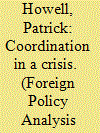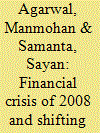| Srl | Item |
| 1 |
ID:
137705


|
|
|
|
|
| Summary/Abstract |
This article explores possible theories of international economic policy coordination, and then proceeds to test these theories through a qualitative analysis of four EU member states – Germany, France, Belgium, and the Netherlands – and their preferences and experiences during the financial market crisis period of Fall/Winter 2008–2009. Both institutional and basic realist theories for coordination preferences are evaluated for explanatory power against the case of the 2008 financial crisis and are found lacking. Instead, this analysis finds that a comparative foreign policy theory of political constraints – institutional design, political polarization, and leader time horizons – emerges as the best fit for explaining the divergence in foreign policies among these EU member states.
|
|
|
|
|
|
|
|
|
|
|
|
|
|
|
|
| 2 |
ID:
126580


|
|
|
|
|
| Publication |
2013.
|
| Summary/Abstract |
Who do citizens blame for the recent European economic crisis? In this paper, we test theories about blame attribution with respect to the economic crisis. We argue that blame for the crisis is partially conditioned by partisan bias and framings of the crisis as being related to globalization. We test the argument with new survey data and a survey experiment from Spain. In the experiment, respondents receive different framings of the economic crisis which are endorsed by different political parties and non-partisan organizations. We obtain the following findings: (i) blame for who is responsible for the economic crisis is greatly affected by partisanship; (ii) making globalization as a cause of the crisis salient exonerates the government of blame, but only for co-partisans of the government; and (iii) citizens are willing to blame other globalization-related factors for the crisis, in particular, European governments and blame the domestic government less. The results expand our understanding of public opinion dynamics during major economic recessions and also suggest conditions under which "scapegoating" globalization can occur.
|
|
|
|
|
|
|
|
|
|
|
|
|
|
|
|
| 3 |
ID:
129057


|
|
|
|
|
| Publication |
2014.
|
| Summary/Abstract |
This article analyses shifts in economic power over the last five decades or so. While developing countries (DCs) and regions have increased their share of incremental world income and incremental world exports over this period, there is very little shift in the relative rankings according to size of GDP of the 25 largest economies in 2011. The economies of South Korea and Brazil have become relatively much larger; the other changes have been minor. The correlations between the ranks over the years are very large showing that there has been little change in the rankings. Also, the GDP and per capita GDP of other countries and regions have increased relative to the US but this increase has been slow, particularly after 1982. The GDP of most of the large DCs has increased relative to that of the US but far fewer have increased their relative per capita GDP suggesting slow rates of growth of productivity and limited structural change of shift in economic activity from low productivity to high productivity sectors. Aggregating 20 indicators to form an index of economic power, we find that there has been little change in the rankings according to this index. Further, measuring the distance of individual countries from the US on the basis of these indicators, we find that most countries have been converging on the US, but very slowly. There is no evidence that the 2008 financial crisis has resulted in a hastening of the decline of the US.
|
|
|
|
|
|
|
|
|
|
|
|
|
|
|
|
| 4 |
ID:
130836


|
|
|
|
|
| Publication |
2014.
|
| Summary/Abstract |
The article considers economic conditions in Western Europe from 2008-2012, particularly in the eurozone monetary union of European Union (EU) countries. A recession during that period is considered and primarily attributed to higher labor costs than in developing countries. The impact of taxation on employment in Western Europe and on foreign direct investment is examined.
|
|
|
|
|
|
|
|
|
|
|
|
|
|
|
|
| 5 |
ID:
130839


|
|
|
|
|
| Publication |
2014.
|
| Summary/Abstract |
The article considers economic conditions in Western Europe from 2008-2012, particularly in the eurozone monetary union of European Union (EU) countries. A recession during that period is considered and primarily attributed to higher labor costs than in Developing Countries. The impact of taxation on employment in Western Europe and on foreign direct investment is examined.
|
|
|
|
|
|
|
|
|
|
|
|
|
|
|
|